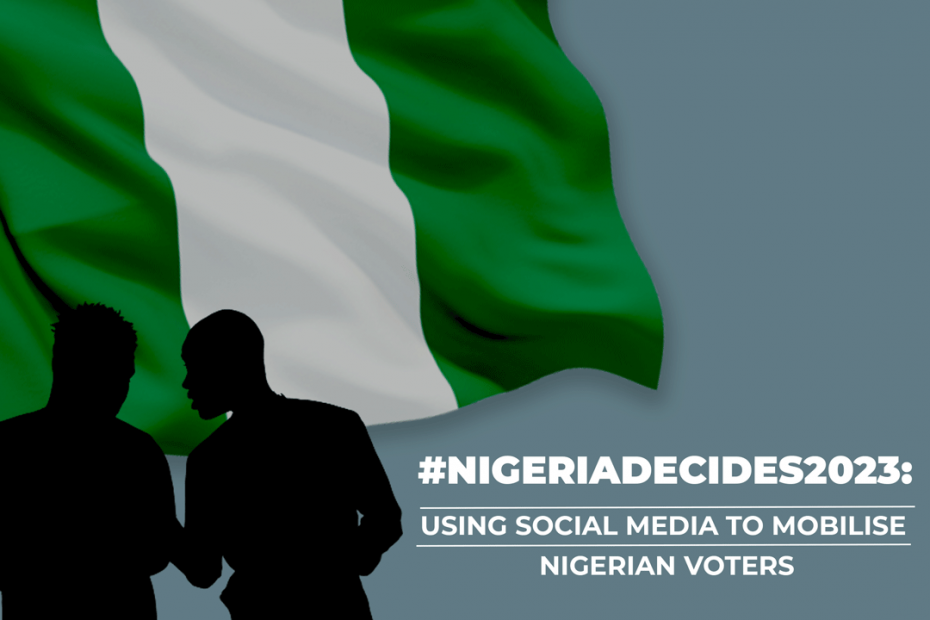Social media has become a fundamental part of Nigerian political life. And this has changed the dynamics of interactions between the Nigerian voter and the politician. In fact, in recent years, social media has evolved into a low-cost, but a highly successful tool for political mobilisation.
When you consider that 54% of Africans see digital media as having primarily positive effects on society, then you will understand why if you are a Nigerian politician running for office in 2023, you must already have a social media presence.
We explained how you can maintain an active social media presence in this article. But, what should you be doing with your social media presence? More importantly, how can you use social media to mobilise Nigerian voters to support your campaign?
10 Ways to Mobilise Nigerian Voters Using Social Media
- Lead the Conversation: You are on social media to sell yourself. Ensure that everything you do on social media positively furthers this goal. This is why it is extremely important from the get go that you have professionals manage your social media account. They will discuss your overall goals with you and then create a social media strategy for you that will support this goal. Remember, you do not want to confuse your followers with conflicting messages. For example, which party do you support? On which party’s platform do you want to run? Who are your political allies? Giving clear answers to these and other questions will help in developing a consistent persona that people will follow.
- Decide who to Follow: After you identify your allies, you need to show good faith by following them. But remember that social media can be used for politics but it is not a political platform. People you follow are at liberty to post other things that interest them. So use your follow button wisely. In a bid to get more followers, some politicians follow people indiscriminately while on the campaign trail only to unfollow them after they achieve their goals. This creates unnecessary bad blood which you do not really need. So, create a criteria for your ‘who to follow’ and stick to this template.
- Listen to Feedback: One of the biggest strengths of social media is that it is very democratic. But, this is also one of its weaknesses. Whether you like it or not, you will get feedback when you engage in conversations on topical issues. Some will be good feedback, while others will be useless. You should be able to sieve through feedback and identify those that are important enough to act on. But keeping people engaged is very important. Remember, the widespread public detachment from politics and a sense of alienation among voters is one of the most concerning trends in recent history. With the help of social media, citizens and politicians communicate and increase public transparency and accountability.
- Crowdsource your Manifesto: Your campaign needs direction. What better way to get the people involved than by crowdsourcing your manifesto. This is also a great way to get every segment of the citizens involved in your conversations. Remember, governance is supposed to affect everyone’s life. So what are the issues that the people want you to address when you get into office? Ask them and then use their responses as part of your manifesto.
- Show your Goofy Side: Your constituents want to know that you are a fun person. Show off your fun and goofy side by talking about other things that interest you. Are you a family man? Talk about family life and community. Do you love sports? Talk about your favourite sport and show support for your local teams. Do you enjoy seeing the occasional movie? Talk about the movies you have seen and what you liked about them. Do you enjoy reading? Talk about the books you have read and why. Showing other sides of you that are not directly about politics will help advance your politics.
- Before you post, Double-check your Facts: This may seem obvious, but it is worth mentioning. Over half of Nigerians use social media as a news source, with several checking in many times every day for headlines. This is why you must not create a reputation for being a bearer of fake news.
While you may need to go on the offensive against your opponent and point out flaws in the policies of opposing parties, you must ensure that you do not include claims or comments that are false. Double-check your facts to avoid retractions. Before making potentially controversial statements, create some form of review procedure or, at the very least, double-check your sources and terminology.
- Post at Least Twice a Day: The Nigerian political news cycle is short and often crowded. There is so much information battling for people’s attention. So, you must be present to compete for this limited attention. Posting at least twice a day at ‘peak’ periods increases your visibility and creates more engagement for your posts. Considering how rapidly the political world moves, getting your most important information and content structured and scheduled is critical.
- Go Live on the Campaign Trail: Whatever position you are vying for, you have a campaign trail. But while it is easy to create these routes offline where you physically meet people, creating a virtual campaign route is also important. Schedule ‘lives’ across platforms. Pick a day to go live on Instagram, host a Twitter Space, go live on Facebook, host a Zoom or Google Meet. These are great ways to create and own your narrative and show your capabilities. Live video is one of the most intriguing aspects of social media that politicians should utilise in mobilising voters.
- Reach Out to Younger Voters: Nigeria has a predominantly young population. Young persons who are 16-17 in 2021, will be eligible to vote in 2023. What are you doing to reach this demographic? You have to start by going where they can be found. On social media, you have to create content that will appeal to them and compel them to go and register and then come out to vote. Remember that voter apathy creates fertile ground for rigging elections. If you are playing to win fair and square then you must ensure that you eliminate voter apathy.
- Do Not Feed Trolls: You are not on social media to feed trolls. So, stop talking about them or calling attention to them. There are several tools on social media for ignoring people who get under your skin without even blocking them. Remember each time you block a person, you are sending out a signal that you may be intolerant of opposing voices. Some people see it as unethical for public officials [and by extension aspiring ones] to block individuals on social media. So, use your block button sparingly or not at all. In the comment section, try to highlight a feeling of community and avoid inciting unnecessary conflict. As an aside, reporting inappropriate comments should be left to supporters and community members. When necessary, try to shift more heated discussions into your DMs or private messages. Be courteous at all times. Note: trolling, harassment, comment spam, and mass account reporting are inevitable from the citizens.
Summary
Many analysts believe that social media will prove to be the game-changer of Nigerian politics in 2023. Getting in early and setting up shop across platforms is a key way to get ahead of your opponents. Using these ten suggestions to mobilise Nigerians on social media have worked for politicians in the past and will work for you.
But while these are high-end suggestions on what you can do, the devil is in the details. Knowing the specifics of what to post and having the presence of mind to decide what you should not say and cannot say are very important. Additionally, matching your social media persona with your offline personality is key to ensuring that you do not confuse your audience.
Slvr Wlf Digitale offers comprehensive social media management and branding for political candidates and government agencies. Why not book a free consultation with us and let us show you why we should be running your campaign on social media.


Meet Abigail Anaba—your go-to expert for mastering digital strategy. With a postgraduate award in Creating Strategic Advantage from Warwick University, Abigail transforms complex digital challenges into clear, actionable insights. Her unique blend of storytelling and journalistic precision not only makes her strategies engaging and relatable but also drives real results.

